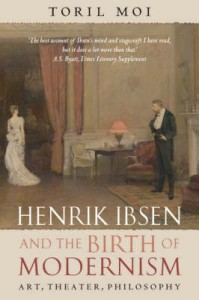By Toril Moi
Like other Norwegians I am in shock at the terrible events in Oslo and at Utøya on 22 July. My heart goes out to the victims and their families.
I was not in Norway when the horror happened. On 22 July, I was giving a talk about Ibsen’s 1873 play Emperor and Galilean at the National Theatre in London. I only learned about the bombing in Oslo and the massacre at Utøya later that night. When I discovered that the terrorist in Norway saw himself as a crusader against Muslims, I realized that Emperor and Galilean is more dreadfully relevant than ever, for it is about the horrors — persecution, torture, murder, crazed search for martyrdom, wars — produced by religious fanaticism, by people hell-bent on being right, on forcing others to submit to their will, but who have no capacity to love.
In London last week I also saw Tosca. When the heroine finds herself blackmailed by Scarpia, the ruthless chief of police, she sings one of the most touching arias in the history of opera: “Vissi d’arte, vissi d’amore” – I lived for art, I lived for love — an aria in which she wonders how it can be that she, who has never hurt a soul, now is caught in the brutal web of ruthless power. Puccini’s opera shows that people who live for art and love may find themselves destroyed by people who live for power. There is no happy end for Tosca. Yet she was right to live for art, and for love. As one of the young survivors of Utøya said to CNN: “If one man can show so much hatred, then think of how much love we can all show together.” That response effectively undermines the terrorists’ agenda. It will take a long time for Norway to recover from the horrors of 22 July 2011. But in a response like that one, we glimpse a possibility: maybe, one day, something new, something that, like art, requires love and imagination to come into existence, can be built in the ruins of terror.
Toril Moi is James B. Duke Professor of Literature and Romance Studies, and Professor of English, and Theater Studies at Duke University where she is also Director of the Center for Philosophy, Arts, and Literature. Moi is most recently the author of Henrik Ibsen and the Birth of Modernism: Art, Theater, Philosophy and Simone de Beauvoir: The Making of an Intellectual Woman.



[…] Art, love, and the terror in Norway […]